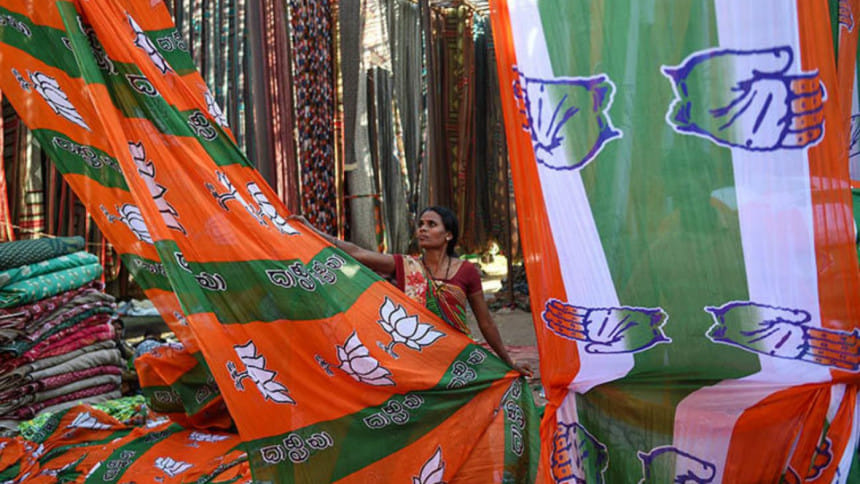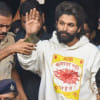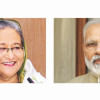Can BJP retain power in the election?

The populist wave that swept BJP to power in 2014 Indian election, led by Mr Narendra Modi, has waned considerably after five years at the helm. A defining factor of BJP's last victory had to do with Mr Modi's unquestioned skill to construct a winning coalition. In this year's Lok Sabha election, it does not look likely that the ruling party can replicate its spectacular success of 2014. Some aspects of its performance in office became contentious and polarising.
A situation has developed in which the other political party with a nationwide presence, the Congress, has been buoyed by its recent performance: it wrested three heartland states from BJP, namely Rajasthan, Chhattisgarh and Madhya Pradesh. In the last general election, the Congress had a disastrous performance as it won only 40 seats in the 545-seat lower house.
There is, however, a broad consensus among analysts that Congress by itself lacks the potential to pose any real threat to BJP. It is much weaker in terms of organisation. In terms of money, which is a big factor, BJP is said to be way ahead of Congress thanks to the support of business tycoons who are lining up behind Mr Modi.
Rahul Gandhi and his sister Priyanka Gandhi have shown promise as leaders who could revive the Congress. However, realistically speaking, they are still in the formative stage of their political life, and hopefully their best years are still ahead. They have never been in power, and from a pragmatic point of view, are no match for the battle-hardened Mr Modi, Amit Shah and their ilk.
The 2019 general election is widely seen as a verdict on Mr Modi's performance in office, and how much of his promises he has been able to deliver on. A large segment of the electorate thinks that the country is on the right track under his stewardship. They adore him. His party has shown a higher level of discipline compared with other parties. It has close grass-root ties with Hindu nationalist groups, which means more street power.
Despite these favourable aspects, BJP's record in office has alienated many vital constituencies. The businesspeople feel that Mr Modi has failed to translate his strong mandate into worthwhile free-market reforms. BJP has irked many by pursuing some ill-advised policies such as the hasty "demonetisation" of 80 percent of India's currency in 2016. Its imposition of high and complex national sales taxes in 2018 or failure to fix bad-loan problem in state-owned banks has dented Mr. Modi's reputation for fiscal probity and the passage of vital economic laws such as that on bankruptcy.
There are many constituencies that feel they have been neglected. Roughly from the middle of its present tenure, BJP's gloss has faded in some measure. The severe drop in growth rate in 2018 has also attracted criticism.
One can say that the farmers are a disenchanted group. Drop in exports and rise in unemployment have also attracted criticism. Farmers, lower-caste Hindus, and religious minorities have reasons to feel alienated from the Modi government. During its current tenure, India's less privileged classes, especially Muslims, have had to face violence, usually from groups linked with Hindu ultra-right nationalists. The UN's High Commissioner for Human Rights, Michelle Bachelet, talked about "increasing harassment and targeting of minorities—in particular Muslims and people from historically disadvantaged and marginalised groups, such as Dalits and Adivasis." Amnesty International also condemned hate crimes and assaults on marginalised groups in India.
The poor sections of society are suffering because of the global rise in oil prices, weaker Indian rupee, and falling prices of farm goods. Intellectuals and the media find Mr Modi's authoritarian style of governance abhorrent.
All this, coupled with the usual anti-incumbency factor, lent some advantage to the Congress. Whether the Congress can fully exploit this advantage, given the lack of experience and skills of its younger generation of leaders, is something that remains to be tested.
The opposition parties say that in order to deflect attention away from his government's inept handling of the economy, Mr Modi seized on the terrorist attack in Kashmir to launch a bombing raid into Pakistan in February.
Modi, it would seem, has a long-term vision of optimism, manifested in his quite audacious dismissal of notable old guards in a bid to revamp the party. His decision to deny nomination to Mr LK Advani, who regularly got elected from the BJP bastion of Gandhinagar, and instead give it to Amit Shah, a rising star and dynamic organiser, has been a big talking point. The media has been eulogising Shah, and for good reason, considering the fabulous fashion in which he constructed BJP's sweeping victory in UP in 2014.
A very important state with 80 seats out of the total 550, UP is always very crucial in the electoral map. In the 2014 elections, BJP trounced its opponents capturing a whopping 71 seats. This year, it is planning to do even better, targeting 74. An important question is, can the Congress make a comeback from its miserable performance in 2014 when it won only 2 seats in UP? It is contesting in all 80 seats without any alliance, and that could be problematic.
The ten most populous states including UP, Maharashtra, West Bengal, Bihar and Tamil Nadu together account for over 350 seats, which means how the main parties perform in these states will matter hugely.
Critically at issue in the 2019 Lok Sabha polls is whether the Hindutva slogan, hitherto pushed successfully by BJP, will get a new lease of life or the secular and progressive ethos which defined India's independence-era politics will reassert itself. Anyone who watched NDTV on April 1 (from 9.30 to 10.15 pm) could not but be struck by the fiercely acrimonious exchanges between BJP spokespersons and the representatives of opposition parties. Nor could one dispute the characterisation of this election by senior journalist Sagarika Ghose as the most polarizing ever seen in India.
Ziaus Shams Chowdhury is a former ambassador.










Comments